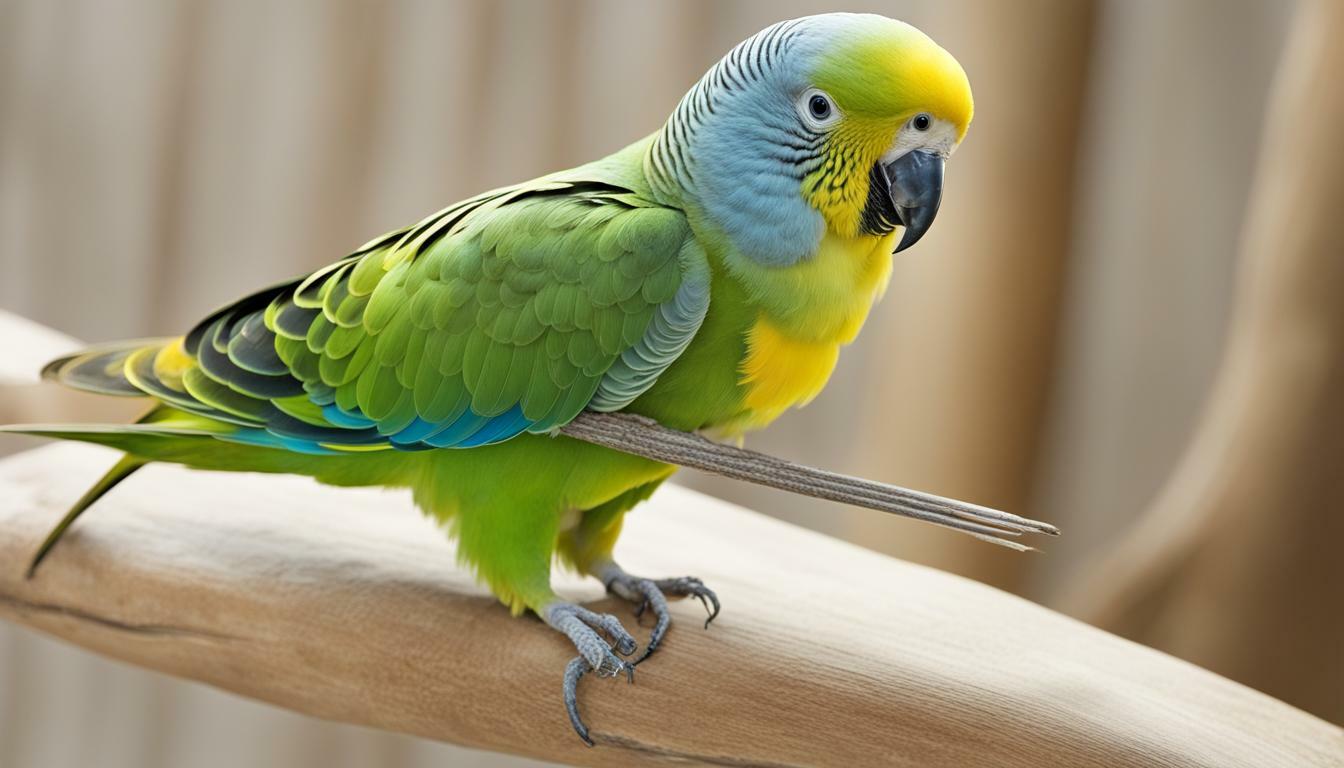Parakeets are lovely pets that can brighten up your home with their vibrant colors and cheerful chirping. However, their behavior can be unpredictable at times, especially when it comes to biting. If you’re a first-time parakeet owner, you may be wondering why your feathered friend would bite you and how to prevent it from happening again.
In this section, we will explore the common behavior of parakeets biting and provide insights into why they may exhibit this behavior. We will also discuss the signs to look out for to identify a biting parakeet.
Key Takeaways:
- Parakeet biting behavior is a common occurrence among pet owners.
- The reasons behind parakeet biting behavior can vary, such as territorial instincts, fear, or feeling threatened.
- Identifying the signs of a biting parakeet can help you prevent getting bitten and promote a safe environment for both you and your parakeet.
Understanding Parakeet Biting Behavior
Parakeets are known for their playful and affectionate nature, but they can also exhibit biting behavior. Understanding why parakeets bite can help you address and prevent these incidents from occurring.
Various factors contribute to parakeet biting behavior. Fear is one common cause, particularly if your parakeet has had negative experiences with humans. Territorial instincts may also cause parakeets to bite, especially if they feel threatened or protective of their space.
Parakeet bites can also be a result of miscommunication and misunderstanding between you and your bird. Parakeets use body language to communicate, and if you misinterpret their signals, they may become frustrated and respond with biting.
If your parakeet has a tendency to bite, it’s important to identify the triggers that lead to this behavior. This can help you address the issue and prevent future incidents.
| Common causes of parakeet biting behavior: | How to address and prevent the behavior: |
|---|---|
| Fear | Gradually build trust with your parakeet through positive interactions and rewards. Move slowly and avoid sudden movements that may startle your bird. |
| Territorial instincts | Respect your parakeet’s space and avoid invading their territory. Provide ample room and resources for your bird to feel comfortable. |
| Miscommunication | Learn to read your parakeet’s body language and avoid actions that may be misinterpreted as threatening or aggressive. Use positive reinforcement to encourage appropriate behaviors. |
By understanding the causes of parakeet biting behavior, you can take steps to prevent and address biting incidents. With patience and consistency, you can build a positive relationship with your feathered friend and encourage healthy behaviors.
Signs of a Biting Parakeet
Parakeets are known for their playful and friendly nature, but sometimes they can display aggressive behavior and bite. It’s important to understand the signs of a biting parakeet in order to prevent injury and build a positive relationship with your feathered friend.
One of the most obvious signs of a biting parakeet is aggressive posture. This can include flapping wings, erect feathers, and an open beak. If your parakeet is displaying these behaviors, it’s best to give them space and avoid approaching them.
Another sign to look out for is vocalizations. Parakeets may hiss, screech, or make other warning sounds when they feel threatened or territorial. These sounds can serve as a warning to back off and avoid any potential biting incidents.
Additionally, be aware of your parakeet’s body language. If they are retreating or hiding, they may be feeling scared or stressed and may be more likely to bite if approached. On the other hand, if they are relaxed and perched peacefully, they are less likely to bite and may be more open to interaction.
Remember, parakeets are complex creatures with individual personalities and moods. The signs of a biting parakeet may vary depending on the situation and the individual bird. By observing your parakeet’s behavior and body language, you can better understand their needs and prevent potential biting incidents.
Training Parakeets Not to Bite
If you are struggling with a parakeet that bites, take heart – with patience and consistency, you can train your feathered friend to stop this behavior. Here are some effective training techniques:
- Positive Reinforcement: This method involves rewarding your parakeet for good behavior, such as remaining calm or perching on your finger. Offer your parakeet a treat or praise when they exhibit the desired behavior. With time, your parakeet will learn that good behavior is rewarded.
- Handling Techniques: When handling your parakeet, use a gentle touch and avoid sudden movements that may startle them. Gradually increase touch duration and intensity, offering treats as rewards for remaining calm. This helps build trust and reduces the likelihood of biting.
- Consistency: It is crucial to remain consistent with your training approach. This means always rewarding good behavior and avoiding reinforcing negative behavior. Over time, your parakeet will learn that biting is not acceptable behavior.
Remember, training your parakeet will take time and patience. If your parakeet does bite, avoid reacting with anger or fear, as this could reinforce the negative behavior. Instead, stay calm and gently reprimand your parakeet, removing them from the situation and withholding treats or attention for a short period. With persistence and positive reinforcement, you can train your parakeet to exhibit non-biting behavior.
Tip: If you are having trouble with parakeet biting training, consider seeking help from a professional bird trainer. They can offer guidance and specialized techniques to help address your parakeet’s biting behavior.
Dealing with Aggressive Parakeets
If your parakeet is exhibiting aggressive behavior, it is important to address the issue as soon as possible. Not only can aggressive parakeets cause harm to their owners, but it can also indicate a deeper underlying issue that needs to be addressed.
Start by creating a calm and safe environment for your parakeet. Keep your voice low and avoid sudden movements around them. Provide plenty of toys and perches for them to play with, and ensure their cage is spacious enough for them to move around comfortably.
Establishing trust is also crucial in dealing with aggressive parakeets. Spend time with your parakeet every day, offering treats and speaking in a gentle tone. Offer your hand for them to perch on and slowly and gradually increase the amount of time they spend with you.
If the aggressive behavior persists, seeking professional help from a veterinarian or animal behaviorist may be necessary. They can provide further guidance on how to address the issue and may recommend training or medication if needed.
Reducing parakeet biting can also involve changing your handling techniques. Avoid grabbing or squeezing your parakeet, as this can cause them to feel threatened and respond with aggression. Instead, let your parakeet come to you, and offer treats and positive reinforcement for good behavior.
Remember, handling aggressive parakeets requires patience, consistency, and compassion. With the right approach, you can help your feathered friend learn more appropriate behaviors and build a stronger, healthier relationship with them.
Conclusion
Parakeets biting can be a common behavior, but understanding why they do it and how to prevent it is crucial in fostering a positive relationship with your feathered friend. By recognizing the signs of aggression and addressing it with effective training techniques, you can significantly reduce the risk of getting bitten.
Remember, training your parakeet not to bite takes patience and consistency. Positive reinforcement methods and handling techniques can go a long way in promoting healthier behaviors. Additionally, creating a calm and safe environment and seeking professional help if necessary can also help reduce aggression.
Final Thoughts
Dealing with parakeet biting behavior can be frustrating, but it is important to approach it with compassion and understanding. By working with your feathered friend and focusing on building a healthy relationship, you can help reduce biting incidents and create a positive living environment for both you and your parakeet.
Are Parakeet Bites Painful?
Parakeet bites and pain: the truth. Contrary to popular belief, parakeet bites are generally not painful. These petite birds have small beaks that lack the strength to inflict significant pain. However, it is essential to handle them gently to avoid any potential discomfort. Regular training and socialization can also minimize the chances of parakeet bites.
FAQ
Q: Do parakeets bite?
A: Yes, parakeets can bite. Biting behavior is common in parakeets and can have various causes.
Q: Why do parakeets bite?
A: Parakeets may bite due to fear, territorial instincts, feeling threatened, or as a form of communication.
Q: What are the signs of a biting parakeet?
A: Signs of a biting parakeet may include aggressive postures, vocalizations, biting attempts, or lunging.
Q: How can I train my parakeet not to bite?
A: Training your parakeet not to bite can be achieved through positive reinforcement, handling techniques, and consistent training.
Q: How can I deal with aggressive parakeet behavior?
A: Handling aggressive parakeet behavior involves creating a calm environment, establishing trust, and seeking professional help if needed.











